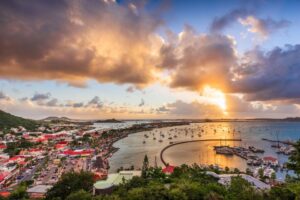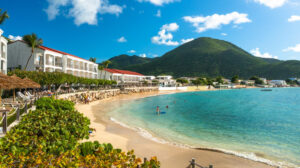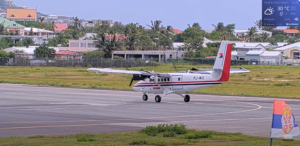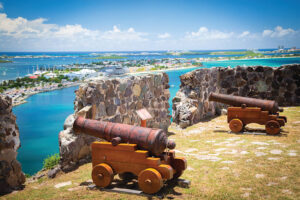This site aims to provide general information about the French side of the island. Also see our Dutch side information and general St. Maarten / St. Martin island information page.

St. Martin (officially: Saint Martin) is also called the “French side” or “northern side” of St. Maarten / St. Martin. It is a overseas collectivity of the republic of France (COM). The French side capital is . This side of the island has approximately 32000 inhabitants. Though its population is smaller than that of , its surface is larger and consists of 62% of the island.

St. Martin is a collectivité d’outre-mer , popularly abbreviated as “COM”. These are first-order administrative divisions like the French regions but enjoy a semi-autonomous status. Contrary to St. Maarten, St. Martin is (full) part of the European Union.

Well known beach resort areas on the French side are Grand Case, Terress Basses and Orient Bay.
The most famous beaches on the French side of the island are Orient Bay Beach, Pinel Island and Baie Rouge.
The southern side of Orient Bay Beach is a globally known spot for the island’s best kitesurfing spots. Next to its beaches, popular attractions on the French side are, dining out in Grand Case and in Orient Bay. Large annual events are amongst others the French side Carnival in February (not to be confused with the Dutch side counterpart in April), Mardis de Grand Case on spring Tuesdays, the SXM Festival in March and the Festival de la Gastronomie in November. See the Event Calendar for more events and French holidays.

Most tourists for French side St. Martin enter the island via the two main gateways of St. Maarten / the Dutch side of the island Princess Juliana International Airport (airport code: SXM), or the French side’s own airport L’Esperance at Grand Case (Flight code SFG) for smaller planes, which connects to other French communities in the region like Guadeloupe, Martinique and The port of Marigot connects with to St. Barths and Anguilla. You can easily take taxis from the main gateways Princess Juliana International Airport and Cruise Port St. Maarten to the French side.

French settlement of the island started after the Dutch capture of the area in order to protect the . Whereas salt was harvested on the French side, its dependence on agriculture was larger when compared to the Dutch side. Slavery was abolished in 1848, 15 years earlier than on the Dutch side of the island.
For a long time, St. Martin was governed from Guadeloupe as part of this overseas department. The French side received COM status on February 9th 2007, at the same time as neighboring . COM status took effect when the new assembly was elected on February 15th. See our dedicated page on St. Maarten / St. Martin history for more information.
Find the French side area on the map below!
The “Two Countries, One e-bike Tour” is a great exploration of the binational character of the island by e-bike.
The “Gem of St. Maarten” e- bike tour takes you to famous Orient Beach, St. Martins partially clothing optional beach.
The Tour de lagoon e-bike tour explores both the French and Dutch side of the Simpson Bay Lagoon.